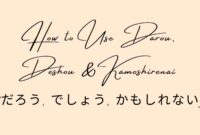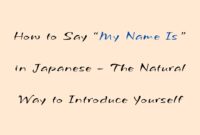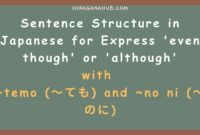Understanding of “はい、そうです” and “いいえ、違います”
In everyday conversations, Hai, soo desu and
Iie, chigai-masu are more commonly used than
Hai, KB1 desu or Iie, KB2 dewa ari-masen. This is because,
in Japanese, repeating words that are already clear from the context is
generally avoided.

Sentence Pattern
はい、そうです / いいえ、違います
Hai, soo desu / Iie, chigai-masu
Yes, that’s right / No, that’s not correct
Explanation
When a question follows the noun-based sentence pattern (KB1 wa KB2 desu ka), the following responses are appropriate:
✅
Hai, soo desu → Used to confirm a statement.
✅
Iie, chigai-masu → Used to deny a statement.
⚠️ Caution ⚠️
- This pattern is only used to answer noun-based sentences.
-
Using Iie, soo dewa ari-masen is incorrect in this context.
Instead, use Iie, chigai-masu to deny a noun-based question.
💬 Example Conversations
A: ルーカスさんはアメリカ人ですか。
Rūkasu-san wa Amerika-jin desu ka?
Is Lucas American?
✅ B1: はい、そうです。(はい、アメリカ人です。)
Hai, soo desu. (Hai, Amerika-jin desu.)
Yes, that’s right. (Yes, he is American.)
❌
B2:
いいえ、違います。(いいえ、アメリカ人ではありません。)
Iie, chigai-masu. (Iie, Amerika-jin dewa ari-masen.)
No, that’s not correct. (No, he is not American.)
❌ B3: × Iie, soo dewa ari-masen.
(Incorrect)
A: ミカさんは医者ですか。
Mika-san wa isha desu ka?
Is Mika a doctor?
✅ B1: はい、そうです。(はい、医者です。)
Hai, soo desu. (Hai, isha desu.)
Yes, that’s right. (Yes, she is a doctor.)
❌
B2:
いいえ、違います。(いいえ、医者ではありません。)
Iie, chigai-masu. (Iie, isha dewa ari-masen.)
No, that’s not correct. (No, she is not a doctor.)
❌ B3: × Iie, soo dewa ari-masen.
(Incorrect)
❌ This Pattern Cannot Be Used for Adjectives
If a question includes an adjective, such as:
❌ 「この映画は面白いですか?」
Kono eiga wa omoshiroi desu ka?
Is this movie interesting?
❌ 「この服は高いですか?」
Kono fuku wa takai desu ka?
Is this clothing expensive?
-
Omoshiroi (面白い) is an adjective meaning “interesting” or
“entertaining.” -
Takai (高い) is an adjective meaning “expensive” or
“high/tall.”
Since both words are adjectives, the pattern
Hai, soo desu and Iie, chigai-masu
cannot be used in these cases.
Practice: Answer Using「はい、そうです」or「いいえ、違います」
b) あなたは男性ですか。(dansei = man)
c)
あなたは女性ですか。(josei = woman)
d) あなたは歌手ですか。(kashu
= singer)
e) あなたは学生ですか。(gakusei = student)
f)
あなたは父親ですか。(chichioya = father)
g)
あなたはロンドン人ですか。(Rondon-jin = Londoner)
📖 Vocabulary from Examples
| Kanji | Hiragana | Romaji | Meaning |
|---|---|---|---|
| 医者 | いしゃ | isha | doctor |
| 歌手 | かしゅ | kashu | singer |
| 男性 | だんせい | dansei | man |
| 女性 | じょせい | josei | woman |
| 学生 | がくせい | gakusei | student |
| 父親 | ちちおや | chichioya | father |
| アメリカ人 | あめりかじん | Amerika-jin | American |
| ロンドン人 | ろんどんじん | Rondon-jin | Londoner |
✨ By mastering this pattern, your Japanese conversations will sound more
natural. Try using it in daily conversations!


